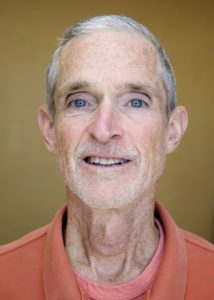by Swami Ramananda
When we talk about the purpose of spiritual practice, we often say something about experiencing our True Nature. What exactly does that imply? When I reflect upon what that means to me, I think of experiencing an innate peace or contentment within myself, as well as a sense of oneness with the whole web of life. This integral sense of connection gives rise to a natural compassion toward all fellow beings, which enables me to derive joy from caring for and serving others.
Of course, the culture we live in obviously paints a different picture. We are conditioned in numerous ways to think of ourselves only as a body and mind, separate from each other. And if we’re unable to experience the spiritual consciousness that is our shared ground of being, we invariably find ourselves living in a trance of separation. This sense of disconnection suggests that something is lacking, leaving us with an underlying sense of incompleteness and insecurity.
Our culture prescribes the solution in the form of acquiring things, achieving goals, and arranging our lives well enough to create the conditions for material security and seeming happiness. Our minds are thus dominated with all the judging, planning, reasoning and evaluating necessary to create a so-called successful life, causing us to dwell so much in our heads that we inevitably lose touch with our hearts.
I think that in many ways the spiritual path is a return to dwelling within our hearts, where we can feel a natural connection to each other and to the source of wisdom and joy that is our True Nature. The sages of many spiritual traditions have asserted that learning to love each other fully is the essence of their teachings. The Dalai Lama once said, “Kindness is my religion.” Jesus Christ gave us the well-known teaching: “Love thy neighbor as thy self.”
In his book, A Path with Heart, Jack Kornfield beautifully articulates this understanding: “When we see the mind’s very nature is to think, to divide, to plan, we can release ourselves from its iron grip of separatism and come to rest in the body and heart… As one great Indian master, Sri Nisargatta, put it, ‘the mind creates the abyss, and the heart crosses it’.”
Of course, we must use our minds to function in the world, and it behooves us all to think clearly, plan ahead and use good judgement. Yes, absolutely. However, our thinking can also function in harmony with a Higher Will when we stay open and connected to our hearts. When we allow ourselves to be guided by a Higher Will, we will have compassion, first of all for ourselves, enabling us to acknowledge our mistakes and recognize our unhealthy behaviors without judging ourselves harshly.
Living with an open heart also enables us to enjoy the connections we make with each other – deep friendship and intimate love are beautiful and powerful aspects of human life to be embraced and treasured. What we must learn though is to love without requiring something in return, experiencing the joy of giving love freely. When a mother loves her baby, for example, she doesn’t expect anything — the experience of opening one’s heart fully to another being is itself fulfilling. We can all learn over time, often from the pain of our unhealthy attachment to others, to love in this selfless way.
Just as we learn to open our hearts in relationships with those we love, we must also learn from our difficult relationships. If we dislike someone that we find annoying or shun those who are struggling, we ultimately hurt ourselves by closing our hearts and failing to remember the spiritual presence and connection that resides within us all. The teachings from many spiritual traditions clearly guide us to cultivate an inner response of compassion to those who are suffering.
In this context, a compassionate mindset does not dictate any specific behavior. Compassion may take many forms — from lending a helping hand to simply offering a prayer, acting with kindness or listening with empathy. This practice keeps our hearts open and at peace, remembering that we too struggle when we are overwhelmed or distraught.
Clearly, the best motivation for serving others comes from experiencing the feeling of compassion flowing through our hearts and the natural sense of joy that arises from giving freely. Ultimately, we are all learning, one act of kindness at a time, that pursuing our spiritual growth also means nurturing the impulse of an open heart to selflessly love and serve as instruments of the Divine Will.
You can join Ramananda this month, online or in-person for:
- Tuesday Tea Time Series (monthly) on Tuesday, FEB 13 @ 11:15 am – 11:45 am PT
- Satsang: Finding Genuine Joy on Saturday, FEB 17 @ 5:30 pm – 6:30 pm PT
- Scripture Study: Next Steps on the Spiritual Path, 3-part on Monday, FEB 19, 26 & Mar 4 @6:00 pm – 7:00 pm PT
 Swami Ramananda, C-IAYT, E-RYT 500, is the Executive Director of the Integral Yoga Institute in San Francisco and a greatly respected senior teacher in the Integral Yoga tradition, who has been practicing Yoga for over 45 years. Ramananda offers practical methods of integrating the timeless teachings and practices of Yoga into daily life, and transforming the painful aspects of human experience into steps toward realizing one’s full potential.
Swami Ramananda, C-IAYT, E-RYT 500, is the Executive Director of the Integral Yoga Institute in San Francisco and a greatly respected senior teacher in the Integral Yoga tradition, who has been practicing Yoga for over 45 years. Ramananda offers practical methods of integrating the timeless teachings and practices of Yoga into daily life, and transforming the painful aspects of human experience into steps toward realizing one’s full potential.
He leads all levels of Yoga teacher trainings and programs around the globe. Ramananda co-developed the Stress Management Teacher Training program and has trained many teachers to bring Yoga into corporate, hospital and medical settings. He a founding board member of Yoga Alliance and is a co-founder of The Spiritual Action Initiative which brings together individuals committed to working for social justice for all beings and for the care and healing of our natural world. His warmth, wisdom and sense of humor have endeared him to many.

